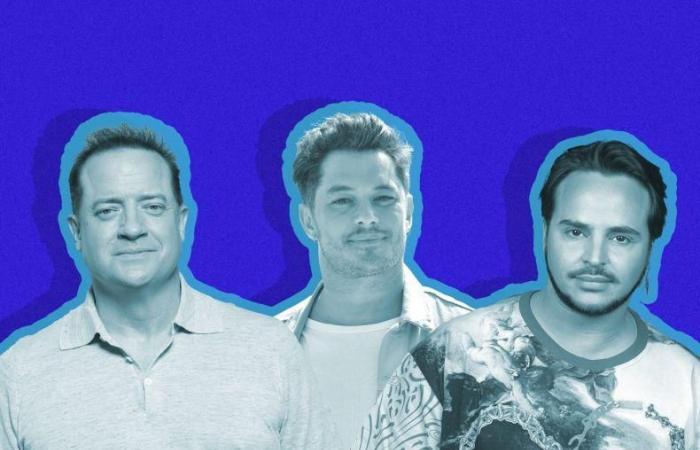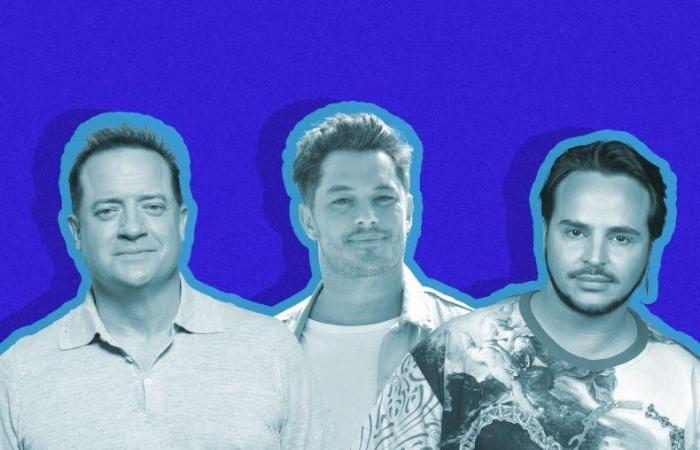Sexual violence –
#MeTooGarçons: It’s men’s turn to break the silence
Testimonies from men who experienced attacks during their youth are increasing. Why did this movement take so long to take hold?
Published today at 10:00 a.m.
The actors Brendan Fraser and Aurélien Wiik, but also the former teacher of the show Star Academy Yanis Marshall, revealed that they were victims of sexual violence.
© GETTY IMAGES/DANIELE VENTURELLI/DOMINIQUE CHARRIAU/ERIC FOUGERE – ILLUSTRATION 24HEURES
Subscribe now and enjoy the audio playback feature.
BotTalk
- Brendan Fraser and Aurélien Wiik reveal being victims of sexual violence.
- The hashtag #MeTooGarçons promotes male testimonies on social networks.
- Stereotypes of masculinity make it difficult to be recognized as a victim.
- Swiss penal reform broadens the legal definition of rape in 2024.
This article from March 25, 2024 was imported from Femina.ch and republished on our site on January 7, 2025.
A photo of a little boy wearing a thin mustache probably drawn with a felt-tip pen, all accompanied by the following text: “From the age of 11 to 15, I was abused by my agent and by other members of my entourage. I complained when I was 16 because he was doing it to others.” This is how French actor Aurélien Wiik, now 43 years old, revealed on February 22, 2024 in an Instagram story the sexual violence he experienced in his childhood.
Since then, testimonies have multiplied on the networks thanks to the rallying hashtag #MeTooGarçons created by the artist. In the world of culture, as among anonymous people, men denounce. Another notorious example: that of the ex-professor at the Star Academy Yanis Marshall who accuses the choreographer of Popstars, Bruno Vandelli, of having attacked him during his adolescence.
A movement that took time
If men today manage to talk about the sexual assaults they suffered in their youth, speaking out has still taken time to become democratized. “This is not the first time that this type of violence has been reported. In the 1990s, stories of child abuse caused a lot of ink to be spilled,” explains David Saltiel, gender consultant, specialist in masculinities and founder of Ouimen. He adds that later, in the 2000s, some young men reported abuse in the sports world.
At this point you will find additional external content. If you accept that cookies are placed by external providers and that personal data is thus transmitted to them, you must allow all cookies and display external content directly.
Allow cookiesMore info
All that remains is that it is the #MeToo wave, born in 2017, which has greatly contributed to making the problem visible on a large scale. But then, why is #MeTooGarçons happening almost seven years later? For Aymeric Dallinge, diversity and violence specialist and speaker for the As de Cœur program, several elements explain this slowness. “First of all, it seems important to me to specify that when the #MeToo movement arrived, it was about making room for women victims since their words still remain too invisible in society. Then, being aware that you have been a victim of sexual violence can take time. Finally, with gender stereotypes still very present, men can have more difficulty recognizing themselves as victims and talking about it.”
Harmful injunctions
Even today, injunctions to masculinity remain fraught with consequences. In our patriarchal society, men are forced to be strong, determined or even eager for intimate relationships. Indeed, as sociologist Sébastien Chauvin explains in an article in the daily newspaper Time: “When men denounce twenty years later an attack committed by another man, it will be more difficult for them to be heard if they are homosexual because, through homophobia, their consent will be assumed by default.” Conversely, the expert notes that when men are victims of women, they are taken less seriously. So many value judgments – internalized or not – which prevent men from assuming a potential victim status. “We often prefer to imagine them as predators. Furthermore, being a male victim implies potentially seeing his virility called into question,” indicates Aymeric Dallinge.
What about the attackers? “As shown the works of sociologist Lucie Wicky, 90% of perpetrators of sexual violence are men,” points out David Saltiel. Although attacks committed by women exist, they nevertheless remain rare. “Moreover, highlighting these very minority cases serves the masculinist discourse to say: “Look, men are not the only aggressors, and women are not the only victims, in fact one of them m ‘put a hand on the buttocks’,” explains Sébastien Chauvin to Le Temps.
Little male solidarity
Even if the cause is moving forward, it is clear that there is still work to be done. Something that would allow us to move forward? Initiate a change in the institutions supposed to welcome the words of victims. “In addition to the fact that there are still too few spaces for men to talk about sexual violence, when we call on the police or the courts, we are generally not heard,” says David Saltiel. Ideally, there would need to be reforms as well as training particularly focused on consent.”
However, even today, men cannot be recognized as victims of rape legally in Switzerland. Fortunately, at the beginning of 2024, the Federal Council set the entry into force of the new criminal law in sexual matters, with its new definition of rape, for July 1, 2024. From then on, any non-consensual penetration, whether whether oral, vaginal or anal, performed on a man or woman will be considered rape.
This speech could lead to others. And according to Aymeric Dallinge, #MeTooHommes would be the next step to achieve. Like the American actor Brendan Fraser, who revealed that he had been a victim of Philip Berk, former president of the Hollywood Foreign Press Association, when he was 35 years old, men should also be able to denounce violence suffered as an adult.
Finally, according to Aymeric Dallinge, in parallel with advances in terms of laws for example, it is absolutely essential to deconstruct certain clichés which prevent male victims from expressing themselves, but also to raise awareness of greater empathy between men.
If the #MeToo movement has inspired a large number of women to support each other, male solidarity seems absent from the debate when a man denounces having been a victim of sexual violence: “We must dare to say things and above all be able to count on a family, friendly and of course professional support, specifies the diversity and violence specialist. In addition, it seems important to me to practice prevention, to dare to set one’s limits, to instill respect for them and for everyone’s body. This is the key to hoping for a possible cure for this sick society.”
Did you find an error? Please report it to us.
0 comments







